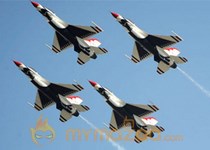The Air Force Thunderbirds team described the cornerstone of their mission Friday to nearly 70 people at Skyhaven Airport.
University of Central Missouri aviation program students asked questions, including about debriefing procedures, which Maj. Jason Curtis said can last seven hours.
"We get done flying and head into the debriefing and we could be there all night," Curtis, lead solo pilot in plane five, said. "We discuss what went right, what went wrong. Our commitment is to get to the root cause."
The Thunderbirds fly the F-16 Fighting Falcon, a "sleek, agile, awesome jet to fly," Curtis said.
Curtis flew the F-16 as a combat pilot for 10 years before becoming a Thunderbird.
To apply, a pilot fills out a "lot of paperwork," he said.
The applicant includes performance reports, recommendation letters, a full-length photo, flight experience. Curtis said the reputation check using phone calls is vital to the application process. He said the team needs to know how a new pilot would fit with the Thunderbirds.
"We have chosen our three new pilots," he said. "One is from Hill AFB, Utah; one is from Osan, Korea; and the third is from Mountain Home AFB, Idaho."
Pilots serve a two-year tour. Enlisted support members serve three years with an option for a fourth.
Staff Sgt. Jay Dayao, San Francisco, California, said the support team application process as not is arduous as for the pilots, but the reputation is still important.
"I think I called them every week asking where they were in the selection process," he said.
Reputation helped Dayao, who received a glowing email recommendation from a former supervisor who also knew Curtis.
"I'll have to show you the email," Curtis told Dayao as they discussed the application process. "As we speak, the 128 support members are at Whiteman preparing the planes for the flight tomorrow."
Staff Sgt. Sean "Mac" MacGibbon, from Seattle, Washington, serves as Curtis' crew chief for plane five. Of all characteristics and skills MacGibbon has seen among the airmen, he said, teamwork most embodies the Thunderbirds' mission.
"It really is service above self," he said. "When I leave the Thunderbirds for my next duty station, I know I will take that with me."
Curtis said an airman who has served with the Thunderbirds, either as a pilot or support crew, is looked up to when they go to another duty station because they bring that understanding of teamwork and service with them.
"It is one of our charges as a Thunderbird team member," he said. "We are to take those skills to our new stations and build up people and teams."
As a pilot who will return to combat flying, Curtis said his time with Thunderbirds has improved his combat fighter skills.
"As a combat pilot, I used to live and breathe combat tactics," he said. "I will have to get back into that way where my fellow pilots have continued doing it for three years while I was serving as a Thunderbird pilot."
The F-16s used in the weekend air demonstration do not serve strictly as demonstration aircraft, they are combat-capable fighter jets. The jets can be repainted and reconfigured as combat fighters.
"We have 72 hours to change them over," MacGibbon said. "We've done it in as little as 27 hours, without the paint job. That is a testament to the strength of our team."







